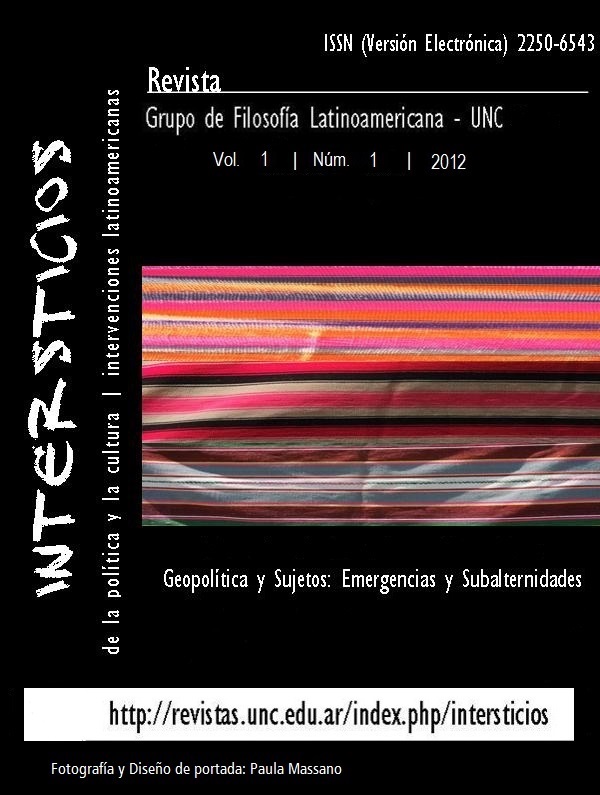TEJIDOS SUBALTERNOS DE REVOLUCIÓN. PENSANDO LAS AUTONOMÍAS LATINOAMERICANAS.
Abstract
Resumen:
¿Cómo es posible pensar una “revolución intersticial”? ¿Cuales son los nuevos momentos revolucionarios de América Latina?
Este trabajo apunta a pensar las democracias latinoamericanas, sus legitimaciones, sus agentes, sus instituciones; cómo conviven, luchan, dialogan, cómo hacen política.
Nuestra perspectiva filosófica-política implica a la democracia, como una constante invención, que produce efectos de sentido en el imaginario político latinoamericano.[1] Dar a la democracia el “terreno de la invención” es reflexionar filosóficamente acerca de las condiciones de posibilidad de los sujetos políticos que se encuentran actuando en dichas democracias. Nuestra intención es poder visualizar a las democracias contemporáneas como un juego entre subjetividades insurgentes, tiempos y espacios de revueltas, rebeliones, revolución (es).
Si aceptamos que la revolución es inevitablemente intersticial[2], nos surgen nuevas preguntas: ¿En qué medida las posiciones de sujeto contribuyen a pensar los espacios intersticiales de emancipación? ¿De qué sujeto hablamos?
Mediante estos interrogantes y los puntos que hemos señalado, nos proponemos dos momentos para tener presentes en el análisis: por un lado, las democracias latinoamericanas como otro lugar de la política y por el otro, los sujetos de las democracias como sujetos subalternos.
Palabras Claves: lo político, sujetos subalternos latinoamericanos, revolución intersticial.
Abstract:
How is possible think one “interstitial revolution”? Which are the new revolutionary moments of Latin-America?
This word point to think the Latin America democracies, it’s legitimizations, it’s agents, it’s institutions; how to coexist, fight, dialogue, how they do the politics.
Our philosophical - political perspective implies to the democracy, as a constant invention, which produces effects of sense in the imaginary Latin-American political. To give to the democracy the field of the invention is think philosophically about the conditions of possibility from the political subjects that are acting in the mentioned democracies. Our intention is, can visualize the contemporary democracies as a game between insurgents subjectivities, times and spaces of revolts, rebellions, revolution (s).
If we accept that the revolution is inevitably interstitial, us new questions arise: In what measure the positions of subject contribute to think in the interstitial spaces of emancipation? What subject do we speak?
Through these questions and the points that we have indicated, we propose two moments to be present in the analysis: on the one hand, the Latin -American democracies like another place of the politics and on the other one, the subjects of democracies as subaltern subjects.
Key words: Latin American, subaltern subject, interstitial revolution.
[1] Véase Liendo C. y Gramaglia P. (2008); Sujetos colectivos en espacios públicos: Democracia y Política en la historia de las ideas de América Latina; Proyecto: Secyt-Ciffyh, UNC. Res. Secyt69/08; Córdoba Argentina.
[2] Holloway J. (2012); Acerca de la revolución; Capital Intelectual; Bs. As Argentina.
Downloads
Downloads
Published
Issue
Section
License
Authors who have publications with this journal agree to the following terms:
a. Authors will retain their copyright and grant the journal the right of first publication of their work, which will simultaneously be subject to the Creative Commons Attribution License that allows third parties to share the work as long as its author and first publication in this journal are indicated.
b. Authors may adopt other non-exclusive license agreements for distribution of the published version of the work (e.g., deposit it in an institutional telematic archive or publish it in a monographic volume) as long as the initial publication in this journal is indicated.
c. Authors are allowed and encouraged to disseminate their work through the Internet (e.g., in institutional telematic archives or on their web page) after the publication process, which may produce interesting exchanges and increase citations of the published work (see The effect of open access).


